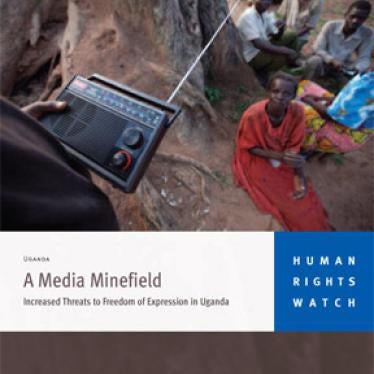(Kampala) - The Ugandan government has done little to investigate or hold security forces responsible in the year since at least 40 people were killed during two days of civil unrest in Kampala, Human Rights Watch said today. Despite multiple promises from government officials after the September 2009 riots, police investigations have not resulted in prosecutions, and a parliamentary committee tasked with examining the incident has yet to call a single witness.
"The Ugandan authorities should prosecute members of the security forces who used unnecessary lethal force during the September 2009 violence," said Rona Peligal, Africa director at Human Rights Watch. "The government's indifference to the families of those who lost their lives is cruel and sets the stage for future abuses."
The riots in the capital, Kampala, began last September 10, when police blocked a delegation representing the Buganda kingdom from visiting Kayunga district. The cultural king of Buganda, known as the kabaka, was planning the visit for National Youth Day, two days later. Leaders of the Banyala ethnic group in Kayunga, who reject the kabaka's authority, opposed the visit.
The kabaka's supporters took to the streets to protest the police action, burning debris in the roads, blocking traffic, and throwing rocks. The security forces often responded with lethal force.
In the days after the unrest, the police conducted brutal mass arrests of hundreds of young men, beating alleged riot suspects. Television stations broadcast film of the arrests and beatings. The government eventually charged at least 31 people with terrorism for burning vehicles and a police station. Twenty-three of them are currently in jail, awaiting trial. At least 80 others are free on bail facing other charges, such as inciting violence and participating in a riot.
However, the authorities have been far less willing to investigate and prosecute alleged unlawful killings by the security forces during and after the unrest. The government officially maintains that 27 people lost their lives, largely as a result of "stray bullets" fired by security personnel deployed on armored personnel carriers. However, hospital records and investigations by human rights organizations put the death toll at over 40.
Soon after the unrest, Human Rights Watch interviewed over 100 witnesses in neighborhoods affected by violence and found that during the two days of unrest, government forces frequently used lethal force unnecessarily and indiscriminately, at times in locations where no active rioting was taking place. Security personnel on patrol fired live ammunition into locked homes, killing and wounding those inside. Human Rights Watch photographed numerous doors marked with bullet holes in some neighborhoods, particularly in Tomusange zone of Ndeeba and zone 4 of Kasubi.
Police sources told Human Rights Watch that they were unable to investigate many of the killings because it was unclear which security forces were deployed to which areas. The police sources recently told Human Rights Watch that two members of the security forces - a special police constable and a soldier - had been arrested and charged with murder for riot-related deaths. Neither has faced trial yet.
The soldier under arrest is alleged to have shot and killed Faisal Bukenya, a father of eight, in the town of Mpigi, where no rioting occurred. In at least three instances, victims' families frustrated by the lack of serious investigations have filed civil wrongful death suits against the inspector general of police.
Along with the promises by public officials in the days following the riots to investigate the deaths, on September 30, 2009, the deputy speaker of parliament ordered the parliamentary Committee on Defence and Internal Affairs to investigate the unrest and issue a report within two weeks. Committee members scheduled visits to affected neighborhoods, but ultimately, no such visits took place.
Committee members interviewed by Human Rights Watch recently said that their efforts were "deliberately frustrated" by government officials who wanted to avoid further discussion of what had transpired. One year later, the committee has not summoned a single witness to give evidence, and no report has been issued.
"Burying the truth won't get Uganda anywhere," Peligal said. "The authorities have failed to follow the government's own orders to investigate the killings and prosecute the perpetrators."
The broadcast media have been curtailed since the September 2009 unrest. One of four radio stations closed by the government, CBS, remains off the air. Kimeeza, a popular open-air broadcast format in which people could comment on current events without having to pay for phone calls, is still suspended. The Broadcasting Council, the government's regulatory body, told Human Rights Watch in March that the suspension was temporary - only until regulations for such broadcasts could be promulgated, but that has not occurred.
Ongoing restrictions on freedom of expression could undermine prospects that elections scheduled for early 2011 will be free and fair, Human Rights Watch said.
"So far, the tragic events of September 2009 have come to symbolize entrenched impunity and the curtailment of free expression in Uganda," Peligal said. "As Uganda heads into elections in early 2011, the government needs to demonstrate a commitment to transparent investigations into official misconduct and to free speech."







